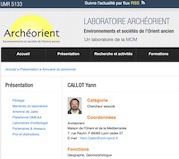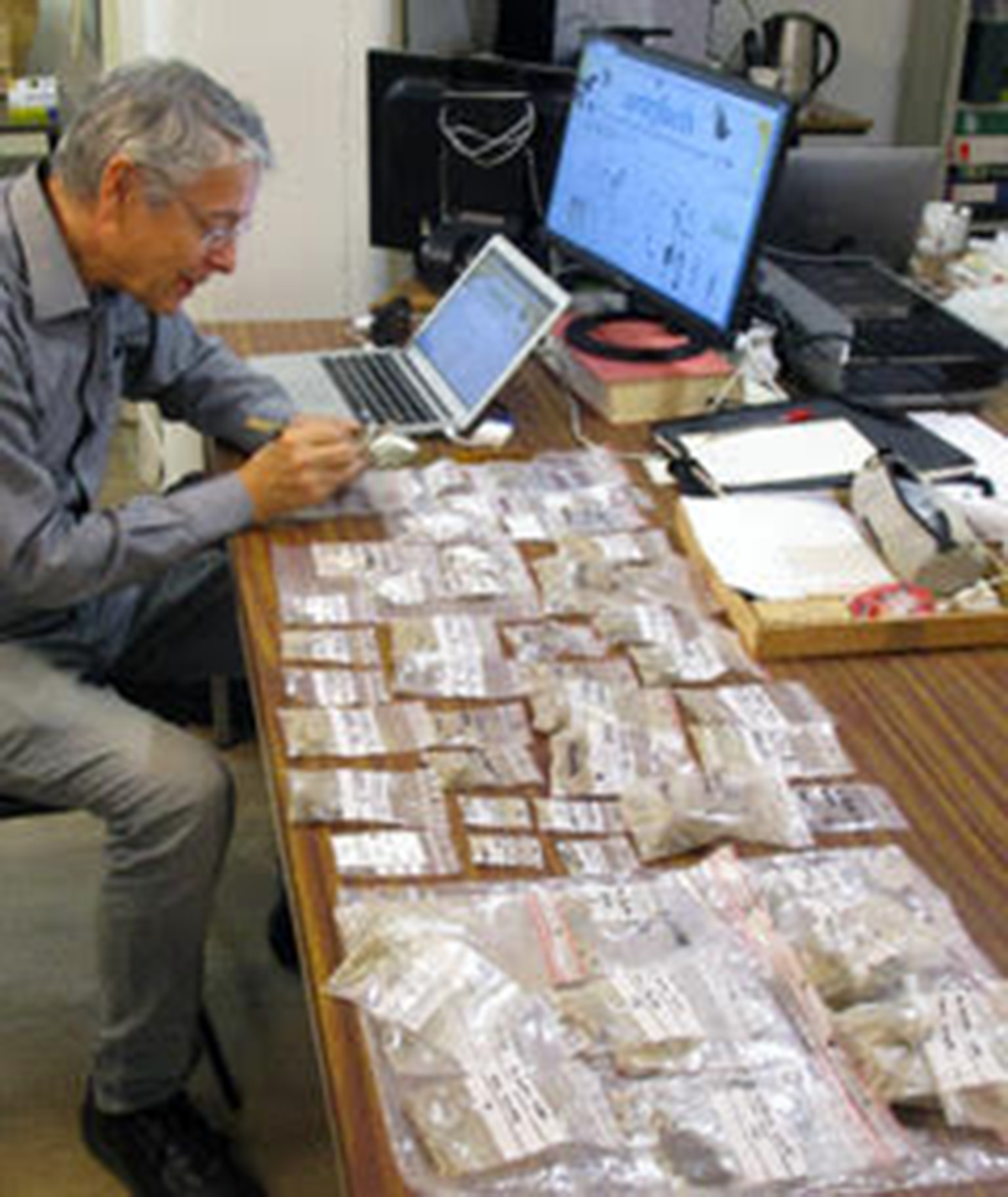Breaches of scientific integrity represent an obstacle for the credibility of science. In this interview, Yann Callot, now professor emeritus of geomorphology at Université Lyon 2, recounts his findings being stolen while he was still a university student.
Interview with Yann Callot
An account to improve professional ethics in the sciences
 How should a PhD student respond when a staff scientist sets their own rules? How might scientific misconduct affect a master’s, PhD or postdoctoral student? These are just a couple of the questions answered in this interview with Yann Callot.
How should a PhD student respond when a staff scientist sets their own rules? How might scientific misconduct affect a master’s, PhD or postdoctoral student? These are just a couple of the questions answered in this interview with Yann Callot.
Who is Yann Callot? What was his situation?
Today, Yann Callot is professor emeritus of geomorphology at Université Lyon 2 and an associate researcher at the Archéorient laboratory (UMR 5133). In 1982, he was still a PhD student, and he was robbed of his findings when the article “Freshwater to marine-like environments from Holocene lakes in northern Sahara” was published in the prestigious journal Nature.
What is a breach of scientific integrity?
Publication is a central theme in the life and career of a scientist. This is why many research practices that could be considered legally objectionable relate to different aspects of scientific publication, as highlighted by the video Scientific Misconduct: Addressing Questionable Research Practices. In the case of Yann Callot, the breaches of scientific integrity were focused on article authorship, specifically the order of the names and the intentional concealment of various pieces of information.
These practices are employed in view of giving prominence to one scientist at the expense of one or more other scientists. Keep in mind that publication in a prestigious journal leads to renown, which results not only in recognition from peers but may also result in the granting of resources and career advancement.
Easily identifiable scientific misconduct?
In Yann Callot’s case, the scientific misconduct was easily identifiable thanks to the previous publication that had occurred. This anteriority was key in proving the intentionality of the misconduct. When it comes to protecting ideas, lab notebooks serve as compelling evidence, which is why they are so important in all fields, including archaeological research.
Yann Callot’s experience highlights the 3 ways in which he was stripped of the authorship of his own findings:
- conflict over the authorship of the article with a change in the order of the authors: although he expected to be cited first, Yann Callot found himself in 3rd position
- intentional concealment of the researcher who made the discovery by removing any mention of the discoverer in the original text, supposedly due to a lack of space for the version to be published
- intentional concealment of the researcher who made the discovery by hiding Yann Callot’s first publication in a flood of old general references
All too common practices
At the time of writing of this article, breaches of scientific integrity and lack of respect for students and non-professional researchers (such as amateurs and volunteers) are still commonplace in archaeology and other fields. This is demonstrated by Adèle Combes’s essay on university research, Comment l’université broie les jeunes chercheurs : précarité, harcèlement, loi du silence, published in January 2022. This essay summarizes studies going back to 1998, with Isabelle Pourmir’s publication, to today, with references to the author’s own investigation, Students thesis life. This did not only concern France, but the whole world, as shown in a 2019 paper in Nature: PhDs: the tortuous truth.
The prevalence of misconduct led to the 2017 creation of the French Office of Research Integrity (English webiste of Office français de l’intégrité scientifique) within the Hcéres. This office is tasked with monitoring, overseeing the application of the French charter of ethics in research professions (English version of Charte française de déontologie des métiers de la recherche) and organizing specialists on questions of scientific integrity in institutions.
It also incited the National Network of Doctoral Colleges (French version of Réseau National des Collèges Doctoraux) to lead an investigation on doctorates in France, Le doctorat en France, Regards croisés sur la formation doctorale, published in 2021. Although this initiative was applauded by the Thésard-es Podcast, it also received some criticism from the podcast’s creators. The group thus moderated the findings, which contrast significantly with numerous publications raising issues met by PhD students.
How should students respond to these poor practices?
As Yann Callot mentions at the end of the interview, it can be very challenging for students to take action. This is as true today as it was back then. However, numerous associations for PhD students have been fighting back for years through practical measures such as the french PhD Guide (Guide du doctorat) by the National Association of Doctors of Science (Association nationale des docteurs ès sciences, France) and the Confederation of Young Researchers (Confédération des Jeunes Chercheurs), a doctorate guide published in 2020 that is still relevant in France at the time of writing of this article. Reading this guide enables future students to anticipate potential difficulties they might face and thus be better prepared. Have a look in your handbook or University’s resources pages, you will find information about academic misconduct, scientific misconduct or scientific integrity like on this page about Academic Integrity from Harvard University.
Students are not the only ones facing these situations. If you experience scientific misconduct, speak up – both for yourself and for science in general – by contacting your advisor, if you trust them, or if you don’t, with associations like:
- in France, the Confederation of Young Researchers or the National Association of Doctors of Science
- in United States, the National Association of Graduate-Professional Students
- in Europe, Eurodoc and especially its Research Integrity & Assessment Working Group
- in South, The World Academy of Sciences (TWAS), the voice for science in the South
If you study archaeology, feel free to reach out to us. Scientific misconduct tarnishes the value of scientific research and there is a high risk of undermining the credibility of scientific practice in the long term. That is why ArkeoTopia contributes to the defense of scientific research, with a particular focus on archaeological research. Discover other subjects related to these issues with our pillar Lobbying.
Acknowledgments
ArkeoTopia would like to thank Yann Callot for his story and Adèle Combes for the answers that she provided to our questions.
Source
- Gransard-Desmond Jean-Olivier, Breach of scientific integrity: first-hand experience, YouTube, 0:05:29, April 25, 2022.
Learn more
- Find your national postgraduate representative body on Wikipedia
- Find national codes of conduct on the International Science Council’s Responsible Science page
- Gransard-Desmond J.-O. and Houdin J.-P. (2018, May 26), Professionals, volunteers and hobbyists in archaeology [Video]. YouTube. https://www.youtube.com/watch?v=n_M3eiS4d9c. – Archéo-Éthique conference in Paris organized by Ségolène Vandevelde and Béline Pasquini
- Gransard-Desmond J.-O. and Maximin N. (2011), « Ethics and archaeology: between regulation and moral obligation », message presented at the 17th meeting of the European Association of Archaeologists, Oslo
You want we do an interview, a review of a book, a documentary or a support related to archaeology, whether for the general public, children or specialists.
Send us an email.
ArkeoTopia, an alternative approach to archaeology® aim is to give another perspective to archaeology today non-in order to better help existing bodies prepare for the archaeology of tomorrow. To know more about the association, feel free to check out our institutional video and our activities.






